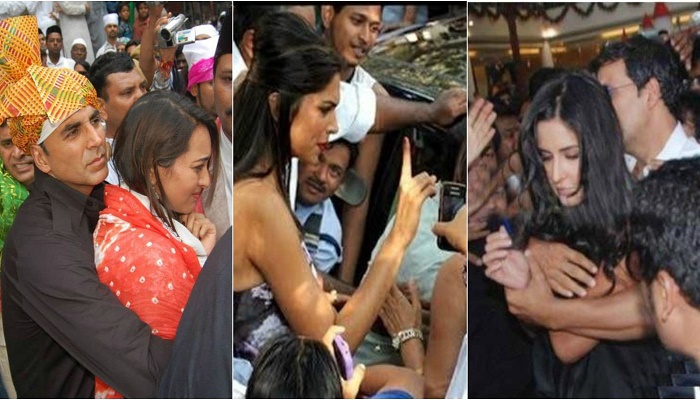
Reena Saini, 26 recalls “One day he called me for an audition. And when I reached the place he said, come into my car and talk, I’m in a hurry.”

While the car idled in Mumbai traffic, and his young nephew sat in the backseat, Saini says the casting director, Sohan Thakur, started to grope her. “It made me so embarrassed,” the Bollywood hopeful says. “I didn’t know if it was intentional, or by mistake. I was numb, I was freaked out.”
After she squirmed from the vehicle, she says Thakur called her with a warning not to share the incident. “He told me, if you say this to anyone, it will be your minus in the industry,” she says. “People won’t see you as a good girl.”
Swara Bhaskar is now an established, award-winning actor in Bollywood, the Mumbai film industry. But she was fairly new to the business when one director started incessantly texting her on set.

It soon escalated to requests for “intense” one-on-one meetings. “He started saying he needed to fall in love with my character,” she says. “He would always call me on the pretext of discussing this lovemaking scene – and I’d go and he’d always be drinking.”
Late one evening he knocked on her door while drunk, she says, and demanded she hugs him. To endure the project, Bhaskar was forced to enlist another crew member as her chaperone.
“Now I understand why in the olden days the actresses used to take their mothers on shoots,” she says.
“The casting couch is one of Indian cinema’s most open secrets,” says Anna MM Vetticad, a journalist, and author on the film industry.
“It is always very subtle,” says Bhaskar. “People try to insinuate that there are 10,000 girls for one role – so what can you do?”
“They make situations uncomfortable and load choices in a way where if women want to get ahead, you have to do certain things,” another prominent actor, Tisca Chopra, says.

“I have lost roles,” Bhaskar says. “I know the directors who won’t answer my calls because I made it clear I would not get into that relationship situation.”
Criticism of this culture is usually expressed as accusations that women are “sleeping their way to the top”, says Vetticad, “instead of pointing to the excruciating pressures women are subjected to in India’s heavily male-dominated industries”.
She adds: “Male producers, directors, and actors have the power to make and break these women’s careers, and so routinely and aggressively proposition them, or at the very least let it be known that a willingness to grant sexual favors would help a woman professionally.”
“It definitely is a problem,” agrees Amit Behl, the senior joint secretary of the Cine and TV Artists Association in Mumbai.
“Mentally, in terms of awareness of the laws, they’ve just come from small towns with big dreams – they face maximum exploitation,” Behl says
This year, a shocking allegation roused the women of one Indian film industry into action.
In February in Kerala state, the centre of Mollywood, the Malayalam film world, a prominent female actor was bundled into a car and sexually assaulted for several hours before being dumped on the street.
In a bombshell move in July, police arrested a major Mollywood star, an actor known as Dileep, for allegedly orchestrating the kidnapping and assault. He denies the charges.
Padmapriya, a National Film Award-winning Mollywood actor, was aghast at the crime – but also by the way the industry reacted to Dileep’s arrest. “All the big actors went and met with him, said everything would be fine,” she says.

Some industry figures attacked the victim, suggesting she was lying or might have staged the crime for publicity. “We were very frustrated,” says Padmapriya, who like many Indians goes by one name.
“It was inspired by our colleague, but the first time we met we didn’t even speak about her – we just talked about our own experiences,” Padmapriya says. “If one woman was talking about the casting couch, I was talking about how I was being sidelined because I was a female actor.
“We realized this was much bigger than what had happened to our colleague,” she says.
Awareness and reporting of crimes against women have grown across Indian society in the past five years, and the film industry has not been immune. “People are becoming more open about it, complaining, expressing their ire on social media, going to the cops,” says Behl.
Bollywood and other Indian film industries have no appetite for controversy. “This is a not an industry that has typically stood for causes,” Bhaskar says.
“It is an industry where actors have to wear any kind of dress or do intimate scenes,” Padmapriya says. “And people assume, if you’re up for doing that, then what’s the big deal?”

Post Your Comments